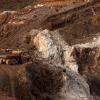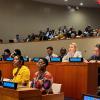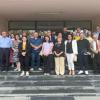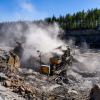News
Displaying Results 1 - 25 of 34
The Principles and Actionable Recommendations for Critical Energy Transition Minerals (CETM) developed by the UN Secretary-General’s Panel set a clear mandate for a global transformation in resource governance.
As Clovis Freire, Chief, Commodity Research and Analysis Section, at UNCTAD, emphasized…
Taking part in the High-Level Political Forum on Sustainable Development in New York (8 – 17 July), UNECE Executive Secretary Tatiana Molcean presented UNECE regional perspectives on SDGs localization, climate action, energy, transport, water and engaged with civil society, youth, and the private…
As Europe advances towards a green and digital economy, the demand for Critical Raw Materials (CRMs) - such as lithium, nickel, rare earth elements and cobalt - is surging. The European Critical Raw Materials Act (CRMA) aims to secure stable and resilient CRM supply chains by setting benchmarks…
In an important move to secure the supply of essential raw materials, the European Critical Raw Materials Act (CRMA) entered into force on 23 May 2024. This legislation is a cornerstone in enhancing the EU's capabilities in sourcing, processing, and recycling critical raw materials (CRMs), which…
UNECE Resource Management Week 2024 spotlighted the growing roles of the United Nations Framework Classification for Resources (UNFC) and the United Nations Resource Management System (UNRMS) in promoting sustainable development through enhanced integration and effective management of natural…
The raw materials sector is at the forefront of global challenges and opportunities of the 21st century, as it plays a vital role in the energy, transport, and digital transitions required to mitigate and adapt to climate change. However, the sector also faces significant pressures from consumers,…
According to a recently published UNECE Policy Paper, the agrifood, the garment and footwear and the mineral sectors contribute significantly to the economic growth and employment in the UNECE region, while being major sources of global greenhouse gases (GHG) and environmental pollution. Evidence…
Transparency in the environmental performance of economic activities and effective public access to environmental information, especially on products, are indispensable in addressing pressing environmental challenges. This also supports a just transition towards a green and circular economy,…
While underground coal mining in Albania stopped almost wholly (except for two private mines with a very insignificant output) more than 15 years ago, the abandonment of the mines from the 1990s onwards with no proper plans for closure has left a legacy of risks. These include water contamination,…
Young professionals from industry, academia, and civil society came together to discuss and explore solutions for sustainable resource management at the UNECE Resource Management Week 2023. Hosted by the UNECE Resource Management Young Member Group (RMYMG), the highly interactive session provided a…
In a move towards sustainable resource management, several countries have presented case studies of how the United Nations Framework Classification for Resources (UNFC) can scale-up harmonized resource management. UNFC provides a common language and standards for the classification of all energy…
The global economy must be urgently steered away from unsustainable production and consumption patterns, which fuel the climate crisis, deplete natural resources and negatively impact both people and the environment. Global value chains are predominantly linear in nature, and the lack of…
The United Nations Framework Classification for Resources (UNFC) is now published in Hungarian. This version, alongside recently published editions in Greek and Portuguese, will support policymakers to implement enhanced sustainable resource management in the UNECE region.
UNFC is universally…
Critical Raw Materials (CRMs) - such as lithium, nickel, copper, cobalt, manganese, graphite and rare earth elements - are essential to deliver on the Paris Agreement and Sustainable Development Goals (SDGs). In the build-up to COP27, UNECE and partners are mobilizing to address the challenges of…
Building resilient energy systems to address the ongoing global energy crisis will be top of the agenda of the upcoming Sustainable Energy Week (19-23 September). Representatives from UNECE's 56 member States will discuss how to ensure energy for optimal social, economic, and environmental…
Circular economy transformation is a new area of cooperation between the United Nations Economic Commission for Europe (UNECE) and the Government of Tajikistan. Under the overarching leadership of the Ministry of Economic Development and Trade, UNECE together with the UN Tajikistan, and in…
The United Nations Framework Classification for Resources (UNFC) is now published in Greek and Portuguese. These translations will support policymakers to implement enhanced sustainable resource management in the UNECE region.
A universally acceptable and internationally applicable scheme for the…
As the sun sets in northern México, less than 100 kilometres from its border with the United States, news from the latest coal mining disaster near Sabinas, in the state of Coahuila, is heartbreaking for the families awaiting at the surface. Military divers who have bravely attempted to make their…
In 2022, international cooperation in energy and critical raw materials is high on the agenda. Optimal use of critical raw materials, for which demand is set to continue rising, will be crucial in delivering the green transition in energy, mobility and the digital world.
This will be in the…
In June 2022, the World Trade Organization (WTO) Members agreed on the Ministerial Outcome Document, which marked for the first time the recognition of the importance of the multilateral trading system in addressing the triple global environmental crises of climate change and related natural…
July is a month to start enjoying the harvest of fruits and vegetables for many in Europe and the topic of reducing food loss and waste becomes very urgent. In Serbia, agriculture is an important sector of the economy, contributing around 6% of GDP. In March 2022 food production accounted for 10.4…
In view of the upcoming COP 27 of the UNFCCC, taking place in Egypt later this year, the growing threats on climate created by the textile and leather sectors call for our urgent action. If we continue down this path, we will fail by 50% to meet our 2030 emissions reduction targets, resulting in…
UNECE was engaged at the main global forum to assess and discuss progress in implementing the Sendai Framework for Disaster Risk Reduction (DRR) – the seventh session of the Global Platform for Disaster Risk Reduction (GP2022) held in Bali and online, 25-27 May 2022, fully embracing its theme: “…
There is overwhelming evidence that we need robust management and traceability for the sustainable and circular supply and use of climate-critical raw materials. Calls are increasing for the production of raw materials to embrace circularity. Demand for batteries and other low carbon technologies…
Minerals such as lithium, cobalt, and copper are essential for digitalization, for renewable energy technologies, and for the further deployment of electric vehicles. Demand for these and other minerals – known as “critical raw materials” (CRMs) – is growing fast as governments and businesses act…
























